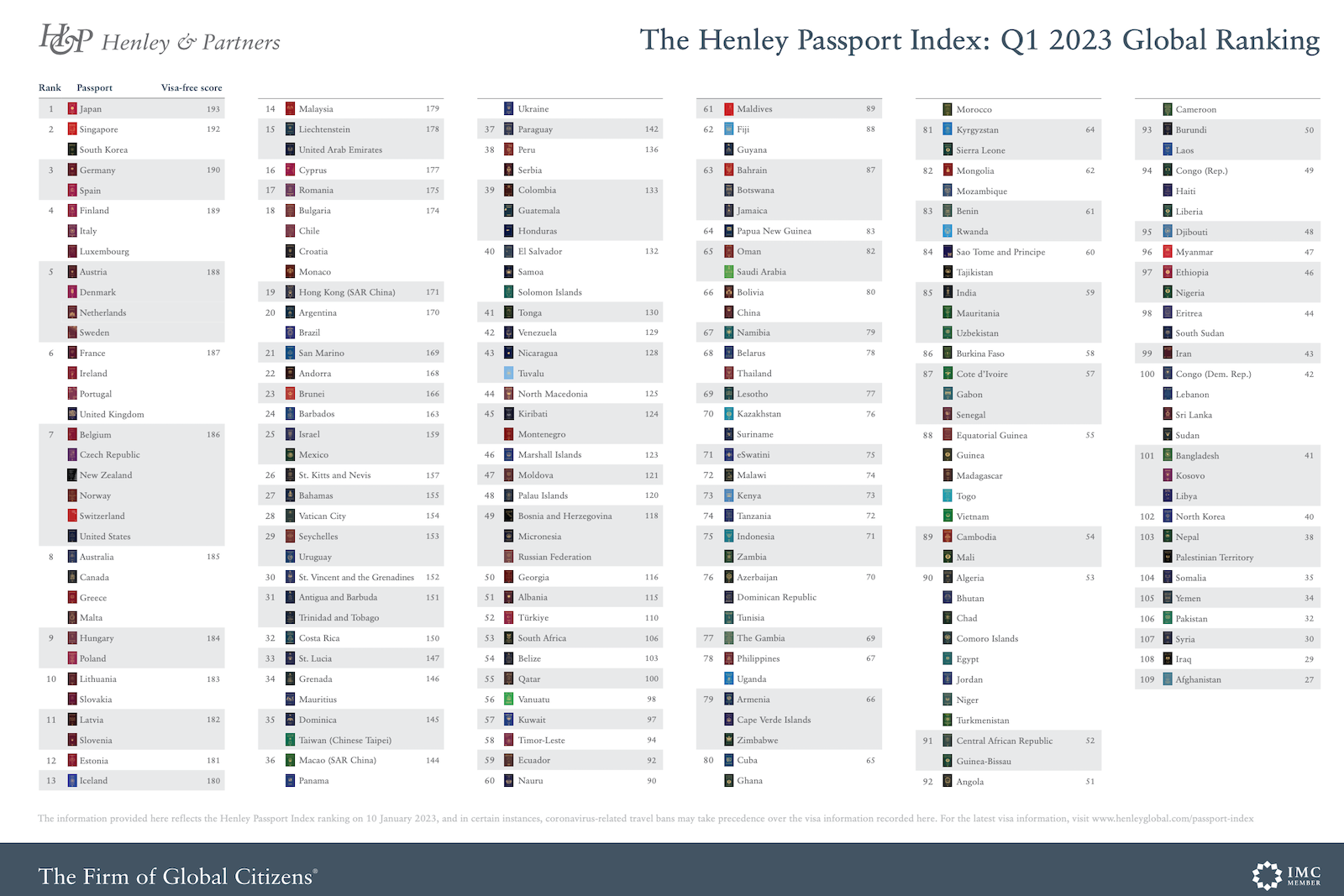In what should come as a surprise to no one at this point, Japan has the world’s most powerful passport, at least according to the 2023 Henley Passport Index. The index has deemed the Japanese passport the “world’s most powerful” for the fifth consecutive year.
As of 2023, Japanese passport holders can visit 193 of 227 destinations visa-free — that’s 85% of the world, according to data from the International Air Transport Association compiled by Henley & Partners.
Quarterly, the London-based residence and citizenship advisory firm issues a report ranking passports by the number of destinations their holders can access without a prior visa.

Two fellow Asian countries ranked second: South Koreans and Singaporeans are eligible to visit 192 countries without a visa. Germany and Spain tied for third with access to 190 destinations, while Finland, Italy and Luxembourg came next with just less than 189 countries. Austria, Denmark, Sweden and the Netherlands came in fifth place with a score of 188.
The U.S. passport came in seventh place — along with Belgium, the Czech Republic, New Zealand, Norway and Switzerland — offering citizens hassle-free travel to 186 countries.
“The U.K. and the U.S. remain in 6th and 7th places, with scores of 187 and 186, respectively, and it appears increasingly unlikely that either country will ever regain the top spot on the index which they jointly held nearly a decade ago in 2014,” the group said in a press release Jan. 10.
Beyond visa-free access to a certain number of countries, the report draws a direct link between strength and economic power based on gross domestic product data from the World Bank.
“The Japanese passport, for instance … gives visa-free access to 193 destinations. Collectively, these countries account for a whopping 98% of the global economy,” per the report. “To contrast this figure with a passport from the lower end of the spectrum, Nigerian passport holders can access only 46 destinations visa-free (20% of the world), with these countries accounting for just 1.5% of global GDP.”
Although the U.S. contributes the most globally to the world’s GDP, visa-free access (or lack thereof) to certain countries hinders American spending power abroad.
Even so, visa-free travel opportunities granted by a U.S. passport exceed most of the world. Only 6% of countries worldwide give their citizens visa-free access to more than 70% of the global economy while less than a quarter provide visa-free access to more than 80% of the world’s 227 destinations, per the report.
Henley expects the U.S. to remain solidly at No. 7. However, it highlights success stories of countries with upward mobility over the past decade — specifically the United Arab Emirates, which climbed 49 places since 2012. Back then, the UAE ranked 64th, with a visa-free score of just 72. Today, UAE citizens can visit 178 countries visa-free, with a bump in its country roster in 2015 when the UAE and European Union signed a short-stay visa agreement for 90-day stays in any 180-day period.
Other Middle Eastern countries, including Kuwait and Qatar, are expected to sign a visa-free deal with the EU later this year, further enhancing their Passport Index scores.
“They are poised for strong and much improved economic performances,” Dr. Robert Mogielnicki, a senior resident scholar at the Arab Gulf States Institute, said. “Qatar’s hosting of the 2022 FIFA World Cup provided an unparalleled opportunity to market the small Gulf country to a global audience and the World Bank anticipates Kuwait’s growth to accelerate.”
Though the Henley index is widely cited, other reports — including last year’s Global Citizen Solutions’ Global Passport Index — named the U.S. passport the “world’s most powerful,” based on its ranking of investment, quality of life and enhanced mobility indices in 2022.
Although passport rankings may vary based on reports, visa-free travel is a key marker commonly used in ranking passports to determine how easy it is for a passport holder to access other countries.
Related: Most powerful passports for 2022




